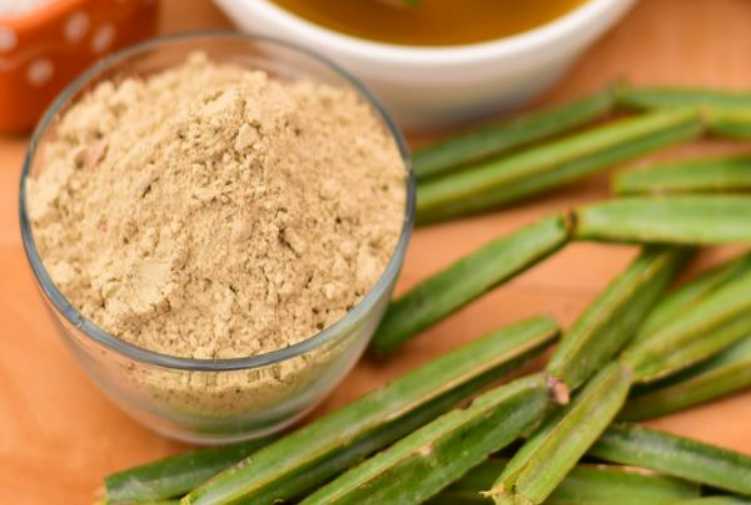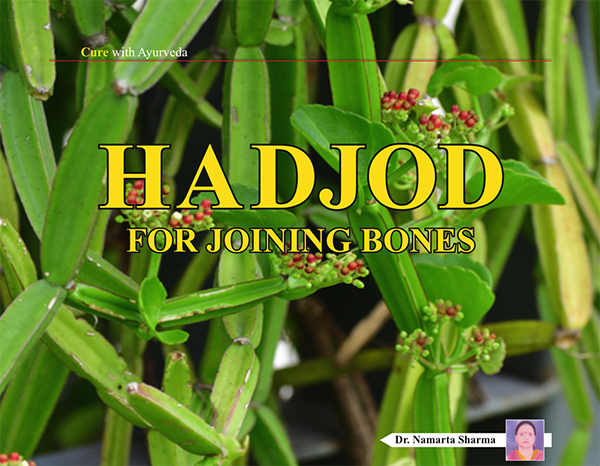Hadjod increases bone strength. It boosts mineralization in the bones and promotes the formation of mineral modules.
Hadjod an ayurvedic herb is widely used in traditional ayurvedic medicines across India. Its scientific name is Cissus quadrangularis. It is a rambling herb characterized by a thick quadrangular fleshy stout stem.
In some parts of the world, the whole plant is used, while leaf, stem and root extracts of plant are used in traditional treatment of various pathological conditions.
Taste-Pungent, Sweet
Action- Light, Dry, Stable
Potency- Hot
Post digestive effect- Pungent
Effect on Dosha- Vatahara, Kaphahara
Phytochemical analysis of plant has revealed high content of ascrobic acid, carotenes, anabolic steroidal substances and calcium. Its traditional name is 'Harjor' or 'Bone setter', means that joins the bones.
In Ayurveda, it is called as Asthisamhar. It strengthens bones and induces joints mobility. It acts as a purgative and relieves the constipation. It is an aphrodisiac and improves vigour. It increases pitta dosha in the body and relieves amadosha (indigestion).

BENEFITS OF HADJOD
1. Bone Healing
The plant extract has been shown to have bone fracture healing properties by increasing uptake of minerals like calcium, sulfur and serotonin which help to build more bone. It increases the rate of bone regeneration and mineralization. It improves blood circulation and nutrient supply to bone. It promotes osteoblastic proliferation and differentiation.
2. Anti Ulcer
The stout stem is traditionally used for the treatment of gastritis and constipation. Its extract shows significant anti ulcer activity by decreasing gastric secretions and by enhancing glycoprotein level which prevents infection.
3. Antioxidant
The stem part of Cissus quadrangularis contains vit-C, carotenoids, calcium, phytosterols which are known as excellent antioxidants. Dietary intake of plant has positive effects on stress related pathologies.
4. Anti haemorrhoidal
Phytochemical study of hadjod reveals that its major compounds are flavonoides. These bioflavonoids have shown potential benefits in the treatment of haemorrhoids and varicose veins.
5. Analgesic
The analgesic effect of this plant is seen in bone fractures and arthritis.
6. Bone Strengthener
Hadjod increases bone strength and restores bone. It boosts mineralization in the bones and promotes the formation of mineral modules. It promotes osteoblastic proliferation and differentiation and reduces the susceptibility to bone fracture.
7. Regulates Lipid Profile
It improves metabolism of lipid by reducing level of LDL (bad cholesterol) and triglycerides. Further, it also increases HDL (good cholesterol) level in blood.
8. Checks Heavy Menses
It is used to manage abnormally heavy or prolonged menstrual period.
Dose of Hadjod
- Decoction of dried stalks - 20-30 ml two times a day.
- Juice- 10-20 ml two times a day.
- Powder- 3-6 gm two times a day.
It should be taken 2 hrs after meal with warm milk or water.
Ayurvedic Formulations of Hadjod are Lakshadi Guggul and Panchjeerak Gudam
In conclusion we can say that this plant can be used to treat a variety of health disorders. Since ancient times ayurvedic physicians have been using it to treat painful conditions like repair of bone fractures and to regulate menstruation.
Dr. Namarta Sharma
Assistant Professor,
Department of Shalya Tantra,
Dayanand Ayurvedic College,
Jalandhar(Pb.).







 Dec 2024
Dec 2024
 May 2024
May 2024
 September 2022
September 2022
 April 2022
April 2022
 October 2020
October 2020
 Jan 2020
Jan 2020
 June 2019
June 2019
 January-February 2019
January-February 2019
 Augest-September
Augest-September
 April 2018
April 2018
 November 2017
November 2017
 June 2017
June 2017
 November 2016
November 2016
 September 2015
September 2015
 March 2015
March 2015
 July 2014
July 2014
 January 2014
January 2014
 July2013
July2013
 March 2013
March 2013
 May 2012
May 2012
 May 2011
May 2011
 Sep 2010
Sep 2010
 Jun 2010
Jun 2010
 Feb 2010
Feb 2010
 December 2009
December 2009
 August 2009
August 2009
 June 2009
June 2009
 Feb 2009
Feb 2009
 December 2008
December 2008
 October 2008
October 2008
 March 2008
March 2008
 July 2008
July 2008
 May 2008
May 2008